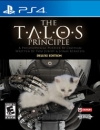| Veknoid_Outcast said: But it's a video GAME. A good story can keep a movie or a book or play aloft but not a game. That's what distinguishes gaming from other media: a level of interactivity and a set of rules. The further video games retreat into the realm of literature or cinema the less impressive they become, the less they take advantage of the features unique to gaming. |
Even though it's a videogame, videogames aren't constricted in any specific way or percentage that should determine how much can be included in the interactivity part, and how much should go into something else. Then again, I disagree that retreating into the realm of literature makes videogames be less impressive, especially when videogames can tell unique tales that cannot be told in other formats (There's 9 hours, 9 persons, 9 doors if you need a reference of such, a heavily text-based videogame which tells a story that can only be told through a videogame).
I can totally understand someone who would prefer games over their gameplay than the story the can tell. I made my university project about videogame narratives and I completely concluded that, despite how impressive narratives can be, stories are always a sub-element of the construction of such, subordinated to the code source (interactivity), visual representation and sound. But even so, to say stories can't save games whose gameplay element is bad or lacking is a stretch, because the good thing about videogames is that you can enjoy them in several levels, unlike books or movies. And even then, toying with the medium is always a fun thing to do, and giving focus to the narrative is something that shouldn't be disliked. No one should call Rayuela a "bad book" only because instead of following the traditional literature structure, Rayuela chooses to do whatever it wants and allows you to read the book's chapters in any order you want (going as far as giving the "reader" interactivity within it). No one should chastize a game only because instead of pursuing a fine gameplay that enables the narrative to be told in the first place, the game chooses to focus its strenght on the narrative section of it. Just look at Telltale games: extremely barebones interactivity with almost non-existent gameplay in it, yet the people found to their liking the stories told within, which is what pursued people into consuming this kind of games, and critics awarding these GOTY.
FunFan said:
Universal praise? From what Universe? |
Just a few examples:
· To the Moon has received generally positive reviews. Critics, while noting that the gameplay itself was lacking, praised the story and music.[18] The game holds an average rating of 81 out of 100 on Metacritic,[10] and 81.53% on GameRankings.[9]
In GameSpot's 2011 Game of the Year awards, To the Moon was given the "Best Story" award, which was won against Catherine, Ghost Trick: Phantom Detective, Portal 2, and Xenoblade Chronicles.[17] which were also voted in the same category. To the Moon was also nominated in the categories of "Best Music",[19] "Most Memorable Moment",[20] "Best Writing/Dialogue",[21] "Best Ending",[22] and "Song of the Year".[23]
· Her Story was well received by critics. Review aggregator Metacritic calculated an average score of 91 out of 100 based on 10 reviews for the iOS version, indicating "universal acclaim",[39] and 86 out of 100 based on 49 reviews for the Windows version, indicating "generally favorable reviews".[40] Metacritic ranks the game within the top 20 iOS and Windows games released in 2015,[49][50] and GameRankings ranks Her Story within its top 100 iOS games of all time.[51] Praise was particularly directed at the game's narrative, [...] Critics lauded the game's narrative. Kimberley Wallace of Game Informer wrote that the "fragmented" delivery of the story "works to its benefit".[42] She appreciated the subtlety of the narrative, and the ambiguity surrounding the ending.[42] Polygon's Megan Farokhmanesh noted that Her Story "nails the dark, voyeuristic nature of true crime".[47] Chris Schilling of The Daily Telegraph was impressed by the coherence of the narrative, "even when presented out of order"
· Within two weeks of its release, the modification was downloaded more than 90,000 times.[3] Responses of most players were positive, and Wreden became "an overnight internet sensation among hardcore gamers."[30]
The Stanley Parable modification was praised by journalists as a thought-provoking game, praising it for being a highly experimental game that only took a short amount of time for the player to experience.[1][3][31] Many journalists encouraged players to experience the game themselves, desiring to avoid spoilers that would impact the player's experience, and to offer discussions about the game within their sites' forums.[31] Ben Kuchera of Ars Technica noted that while the game purportedly gives the player choice, many of these end up lacking an impact, as "to feel like you're in more control than you are".[31] Brighting's voice work was considered a strong element, providing the right dry British wit to the complex narration.[1][32] Alex Aagaard from What Culture believes that The Stanley Parable "will be regarded as one of the most pioneering games of all time" during videogames' transition from entertainment to a legitimate and respected art form.
· Thirty Flights of Loving received generally favorable reviews upon release. On Metacritic, which assigns a normalized rating out of 100 to reviews from mainstream critics, the game received an average score of 88 out of 100, based on 10 reviews.[17] Destructoid's Patrick Hancock awarded the game 9.5 out of 10, stating that "you'll never look at linear storytelling the same way again."
Mind you, I'm purely talking about the narrative perspective of these games. I know plenty of people, for example, disliked Deadly Premonition for its terribly dated and awkward gameplay, but based on personal experience, it's hard to find someone who disliked the plot itself. In several instances, the story was the reason alone why some people kept playing the game.

















